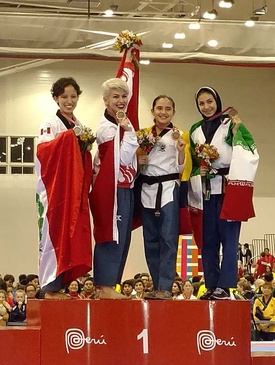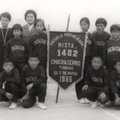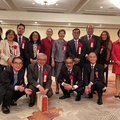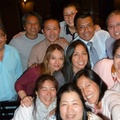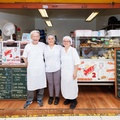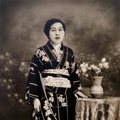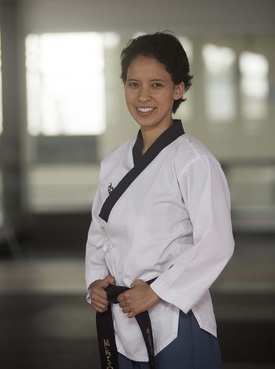
2019 is the second best year of Marcela Castillo Tokumori's sports career. At the Pan American Games in Lima he won the silver medal in the poomsae modality in taekwondo. If the Games became a great national holiday, it was thanks to people like her.
His best year was 2016. That's when his career took off. She was world runner-up and achieved elite athlete status. By a happy coincidence, her two greatest achievements took place in Lima, so her family was able to share their joy with her in situ. “It gives it a bigger feeling ,” he says.
Successes did not come by decree. It's been a long road since he started practicing taekwondo when he was just five years old. He has attended eight World Cups and traveled a lot.
At the age of 14 he represented Peru for the first time in a World Cup, in South Korea. It was a decisive experience. "I liked the experience, I enjoyed it, I had so much fun that I said 'I'm going to dedicate myself to this, I want to continue practicing, I want to continue improving, I want to return to the next World Cup, I want to continue representing Peru," he remembers.
That ironclad conviction has led her to be one of the best in the world in a discipline that little by little is beginning to gain followers in Peru. Marcela found her way in poomsae, a combination of attack and defense movements.
As a girl she fought, but she didn't like it. She chose poomsae to compete with herself, to challenge herself, to get as close as possible to perfection.
“It's a competition with yourself because sometimes your own body limits you a lot, it doesn't respond as you would like, but you have to find a way to make it react,” she explains.
More than surpassing another, it is about surpassing oneself. “I challenge myself, I do a better version than I had in the previous competition. I seek to exceed my limits and push myself day by day to be a little better than I was yesterday.”
THE NOW IS THE ONLY REAL THING
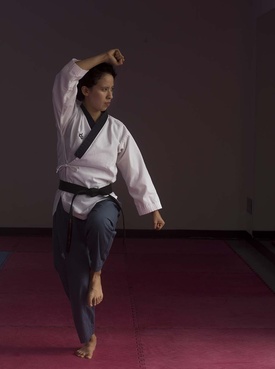
What is an elite athlete like? How is it prepared? What distinguishes him from other mortals? Talking to Marcela Castillo, inquiring about her habits, her mentality, her beliefs, is to approach a select world that can only be reached after a lot of work. But work is not understood as sacrifice, as something that is done reluctantly, as a kind of penance for a possible future reward, but as the daily exercise of a passion.
“You have to enjoy the process,” he says. “The process is now. If you are limited by the objective, if you think so much about the future, about the upcoming championship, then you stop being present. The process is the most fun, the most exciting part of this career. You can do well in a championship, you can do badly, you don't know what will happen, but if you didn't enjoy it, you will only remember if you won or lost. “Enjoying every training session, enjoying every thing you do at that moment… for me it is very exciting.”
Being passionate about the journey, not just the destination, helps you not give up. Marcela knows it because she lived it firsthand. “I tried and tried and didn't win anything, but I continued because I loved training,” he remembers.
“It's good to have goals, to know what you want to achieve, but it's also important how you feel. Did you know? If you focus so much on the future, you are doing it for something that does not yet exist, you are getting too far ahead. “One always has to enjoy the now because it is the only real thing.”
Perseverance is another key factor. Do you train, prepare and lose? You try again. “Ya, OK, you lost. The next day you train harder,” he says.
There is no human being who does not falter. When motivation weakens (it is impossible to get up every day at the top), “that's where discipline comes in. “You have a commitment to your sport, to your country, to yourself.”
Marcela has always been disciplined thanks to her training at home, but sport has given her something extra. “Sport forms a lot of character, it develops the values of perseverance, commitment, responsibility.”
The head also plays. Beyond ability or effort, if you are not strong up there, the chances of winning are reduced. Marcela considers that mental work is basic.
“We focused a lot on the technical, your body may be very well prepared, but if you are in competition and you doubt... it was. You won't get the technique because you hesitated. You have to be 100% in that moment, be aware of every technique and movement you do.”
"I WANT MORE"
In 2017 Marcela Castillo received sporting laurels for her world runner-up finish. How does it feel to see your name immortalized on the front of the National Stadium?
“There were too many feelings: joy, excitement, pride, feeling that all the effort was worth it. Most of all, what I remember is the motivation I felt: 'Now, I achieved this goal, I want more, I want to go to the next World Cup, I want to continue bringing achievements to Peru.' You feel happy to have given so much for the sport, and to be recognized in that way is nice.”
Marcela does not say it, but she hints at another of the drivers of her success: ambition. Where others would probably have said “I've done it,” feeling like they've reached the top, she found a new drive to keep improving.
The laurels meant greater responsibility for her. If she worked hard before, now she had to work much harder because the recognition put her on the map, with which expectations grew. Pressure? No, that's a word he always distances himself from. “I still have fun, that's why I don't call it pressure, because it's not something that stresses me out, that's negative.”
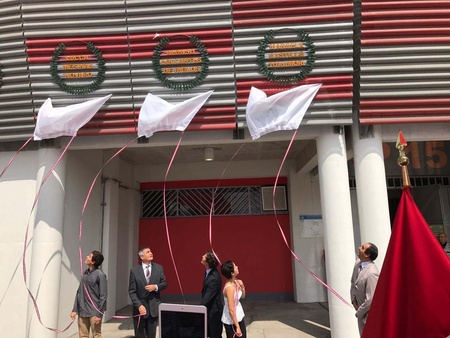
“I COULD BE THERE, BUT…”
Marcela is also an industrial engineer, but now she is completely dedicated to sports. Relegating your profession has a cost. "I see my friends who are already studying their master's degrees, who are out working, who continue to climb positions and... you really get a feeling like 'oh, I could be there, I could be continuing with my career,'" But I think about what I am achieving, that what I am doing really fulfills me, makes me happy, and I don't regret anything. Now all my attention is being given to sports. "I don't know how much longer I can be here, as an athlete, so I enjoy it."
It is not easy to be an athlete in Peru. It is a career with constant dilemmas. Studies or sports? Work or sport? Furthermore, elections are not necessarily irreversible. Today you can choose sport, but later you decide to prioritize work. Or vice versa.
Marcela has debated between one path and another over the years, since her student days. Sometimes it is difficult to choose. The support of her parents has been essential there, who have always been by her side to clear the dark clouds, helping her to distance herself, take a break and better decide what to do.
The recognition of the two-time Bolivarian champion is also a reward for her parents, to whom she is grateful for everything they have done and do, from taking her to training when she was a child to motivating her when she needs it most.
BE SO ME
Marcela has received much more than sports medals. Being an athlete has also meant for her to know herself better, illuminating facets of her personality that she ignored or did not value enough.
“Having discovered myself is one of the most beautiful things, I feel that when I train I am so me,” he emphasizes. “Sport gives you that self-discovery. I feel that I am a very self-critical person, that I am not easily pleased. I am very meticulous, I take care of every detail of everything I do, not only in sport.”
Although Marcela always says that she has fun with sports, being a highly competitive athlete carries a great responsibility that not everyone can handle. She has achieved it and discovering that she has the strength to hold the weight on her shoulders makes her happy.
Memories are another great gift of sport. Also friends. Meet people who share your passion for taekwondo. Travel, open up to the world, be a global citizen. "I love traveling. You meet people from such different cultures who are so similar to you: they seek the same goals, they train, they have the same routines. Finding so much similarity with these people seems super cute to me, super cool,” he says with that perennial smile that seems to be a hallmark of his personality, simple and positive.
Marcela's next goal is the World Cup to be held in Denmark in May*. He will once again represent our country. “It's nice, it's a huge pride, but at the same time it's a super big responsibility. In fact, when you are on the court you are not Marcela Castillo, you are Peru. You take giant Peru behind, you take an entire country to the competition.”
*Editor's note: the event was canceled due to COVID 19.
* This article is published thanks to the agreement between the Peruvian Japanese Association (APJ) and the Discover Nikkei Project. Article originally published in Kaikan magazine No. 122, and adapted for Discover Nikkei.
© 2020 Texto y fotos: Asociación Peruano Japonesa



